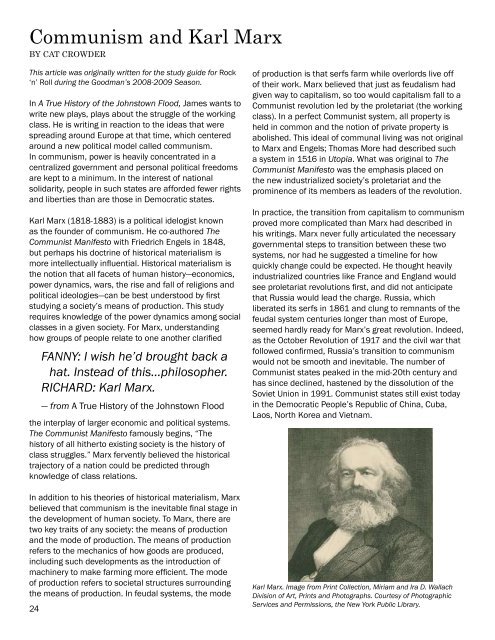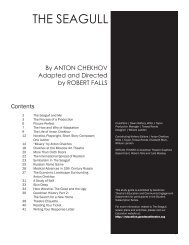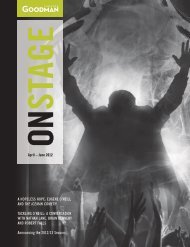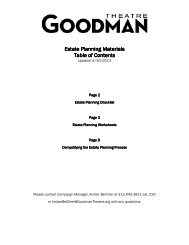A True History of the Johnstown Flood Study - Goodman Theatre
A True History of the Johnstown Flood Study - Goodman Theatre
A True History of the Johnstown Flood Study - Goodman Theatre
You also want an ePaper? Increase the reach of your titles
YUMPU automatically turns print PDFs into web optimized ePapers that Google loves.
Communism and Karl Marx<br />
BY CAT CROWDER<br />
This article was originally written for <strong>the</strong> study guide for Rock<br />
‘n’ Roll during <strong>the</strong> <strong>Goodman</strong>’s 2008-2009 Season.<br />
In A <strong>True</strong> <strong>History</strong> <strong>of</strong> <strong>the</strong> <strong>Johnstown</strong> <strong>Flood</strong>, James wants to<br />
write new plays, plays about <strong>the</strong> struggle <strong>of</strong> <strong>the</strong> working<br />
class. He is writing in reaction to <strong>the</strong> ideas that were<br />
spreading around Europe at that time, which centered<br />
around a new political model called communism.<br />
In communism, power is heavily concentrated in a<br />
centralized government and personal political freedoms<br />
are kept to a minimum. In <strong>the</strong> interest <strong>of</strong> national<br />
solidarity, people in such states are afforded fewer rights<br />
and liberties than are those in Democratic states.<br />
Karl Marx (1818-1883) is a political idelogist known<br />
as <strong>the</strong> founder <strong>of</strong> communism. He co-authored The<br />
Communist Manifesto with Friedrich Engels in 1848,<br />
but perhaps his doctrine <strong>of</strong> historical materialism is<br />
more intellectually influential. Historical materialism is<br />
<strong>the</strong> notion that all facets <strong>of</strong> human history—economics,<br />
power dynamics, wars, <strong>the</strong> rise and fall <strong>of</strong> religions and<br />
political ideologies—can be best understood by first<br />
studying a society’s means <strong>of</strong> production. This study<br />
requires knowledge <strong>of</strong> <strong>the</strong> power dynamics among social<br />
classes in a given society. For Marx, understanding<br />
how groups <strong>of</strong> people relate to one ano<strong>the</strong>r clarified<br />
<strong>the</strong> interplay <strong>of</strong> larger economic and political systems.<br />
The Communist Manifesto famously begins, “The<br />
history <strong>of</strong> all hi<strong>the</strong>rto existing society is <strong>the</strong> history <strong>of</strong><br />
class struggles.” Marx fervently believed <strong>the</strong> historical<br />
trajectory <strong>of</strong> a nation could be predicted through<br />
knowledge <strong>of</strong> class relations.<br />
In addition to his <strong>the</strong>ories <strong>of</strong> historical materialism, Marx<br />
believed that communism is <strong>the</strong> inevitable final stage in<br />
<strong>the</strong> development <strong>of</strong> human society. To Marx, <strong>the</strong>re are<br />
two key traits <strong>of</strong> any society: <strong>the</strong> means <strong>of</strong> production<br />
and <strong>the</strong> mode <strong>of</strong> production. The means <strong>of</strong> production<br />
refers to <strong>the</strong> mechanics <strong>of</strong> how goods are produced,<br />
including such developments as <strong>the</strong> introduction <strong>of</strong><br />
machinery to make farming more efficient. The mode<br />
<strong>of</strong> production refers to societal structures surrounding<br />
<strong>the</strong> means <strong>of</strong> production. In feudal systems, <strong>the</strong> mode<br />
24<br />
FANNY: I wish he’d brought back a<br />
hat. Instead <strong>of</strong> this…philosopher.<br />
RICHARD: Karl Marx.<br />
— from A <strong>True</strong> <strong>History</strong> <strong>of</strong> <strong>the</strong> <strong>Johnstown</strong> <strong>Flood</strong><br />
<strong>of</strong> production is that serfs farm while overlords live <strong>of</strong>f<br />
<strong>of</strong> <strong>the</strong>ir work. Marx believed that just as feudalism had<br />
given way to capitalism, so too would capitalism fall to a<br />
Communist revolution led by <strong>the</strong> proletariat (<strong>the</strong> working<br />
class). In a perfect Communist system, all property is<br />
held in common and <strong>the</strong> notion <strong>of</strong> private property is<br />
abolished. This ideal <strong>of</strong> communal living was not original<br />
to Marx and Engels; Thomas More had described such<br />
a system in 1516 in Utopia. What was original to The<br />
Communist Manifesto was <strong>the</strong> emphasis placed on<br />
<strong>the</strong> new industrialized society’s proletariat and <strong>the</strong><br />
prominence <strong>of</strong> its members as leaders <strong>of</strong> <strong>the</strong> revolution.<br />
In practice, <strong>the</strong> transition from capitalism to communism<br />
proved more complicated than Marx had described in<br />
his writings. Marx never fully articulated <strong>the</strong> necessary<br />
governmental steps to transition between <strong>the</strong>se two<br />
systems, nor had he suggested a timeline for how<br />
quickly change could be expected. He thought heavily<br />
industrialized countries like France and England would<br />
see proletariat revolutions first, and did not anticipate<br />
that Russia would lead <strong>the</strong> charge. Russia, which<br />
liberated its serfs in 1861 and clung to remnants <strong>of</strong> <strong>the</strong><br />
feudal system centuries longer than most <strong>of</strong> Europe,<br />
seemed hardly ready for Marx’s great revolution. Indeed,<br />
as <strong>the</strong> October Revolution <strong>of</strong> 1917 and <strong>the</strong> civil war that<br />
followed confirmed, Russia’s transition to communism<br />
would not be smooth and inevitable. The number <strong>of</strong><br />
Communist states peaked in <strong>the</strong> mid-20th century and<br />
has since declined, hastened by <strong>the</strong> dissolution <strong>of</strong> <strong>the</strong><br />
Soviet Union in 1991. Communist states still exist today<br />
in <strong>the</strong> Democratic People’s Republic <strong>of</strong> China, Cuba,<br />
Laos, North Korea and Vietnam.<br />
Karl Marx. Image from Print Collection, Miriam and Ira D. Wallach<br />
Division <strong>of</strong> Art, Prints and Photographs. Courtesy <strong>of</strong> Photographic<br />
Services and Permissions, <strong>the</strong> New York Public Library.
















